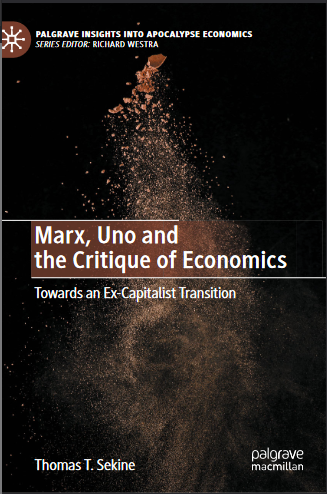

خرید و دانلود نسخه کامل کتاب Marx, Uno and the Critique of Economics – Original PDF
54,500 تومان قیمت اصلی 54,500 تومان بود.27,500 تومانقیمت فعلی 27,500 تومان است.
تعداد فروش: 50
Author:
Thomas T. Sekine
Précis Box 3 Today, the prevailing view is that “bourgeois” economics has attained paradigmatic legitimacy by being “naturalized”, i.e., by pretending to have become an “objective science”, however imperfect, in the same sense as a natural science is believed to be. That is quite different from what I have been claiming here so far, namely that Marxian economics (and more precisely its Unoist variation) represents an objective knowledge of capitalism (or the “capitalist mode of production”, more precisely) as the base (or “substructure”) of modern society, which is a historical society . It is, therefore, quite important to clarify and to stress the point here again that objectivity in the natural sciences is quite different from that in social science, such as economics. If, indeed, one tries carelessly to import the idea of objectivity in the natural sciences into the social-scientific discipline of economics, one is bound to be caught in a “contradiction” even in the formal-logical sense. For, that would mean to assert, in effect, that capitalism is as immutable as nature is. In that case, capitalism could not possibly be a historical society, society that comes into being at one point in history and departs from it at another. I have tried to show, however, that to regard capitalism as immutable as “nature” is would amount to © The Author(s), under exclusive license to Springer Nature Switzerland AG 2023 T. T. Sekine, Marx, Uno and the Critique of Economics, Palgrave Insights into Apocalypse Economics, https://doi.org/10.1007/978-3-031-22630-4_3 39 40 T. T. SEKINE (or would be equivalent to) believing that it is God’s design, and that, with that sort of presupposition, economics is bound to degenerate into a religious dogma, and cannot remain a science in pursuit of any objec- tive knowledge pertaining to ourselves and our deeds as human beings. Only the most reactionary brand of the bourgeois-modern school of economics, which glorifies capitalism as an end in itself, can uphold such a monstrously unreasonable idea without any scruple. 3a) Given your view that economics is essentially the study of capitalism, which is a historically limited society, what sort of “objective knowledge” does or can it claim? We must, first of all, ask ourselves what type of knowledge we can and may expect from economics. From what I have been arguing so far, it should be clear that economics was born with capitalism, and that the latter, for its part, arose when the key use-values that society demanded on a large scale as either necessary or as most desirable could be far more easily producible as commodities than otherwise . In other words, capi- talism evolved as if to follow a natural course of events , when the real economic life of society was historically ready and willing to follow (or be subsumed under) the mercantile principles of capital. When capitalism was still in its early stage of development, the role assigned to economics (then called “political economy”) was to explain the advantages of oper- ating (or managing) society’s real economic life in accordance with the mercantile (or commodity economic) logic of capital, rather than other- wise (that is to say, by simply obeying some authoritative commands or by following traditional customs, for example), and, moreover, that thought increasingly motivated and persuaded classical political economy. It was, of course, very much in the interest of the then ascendant class of the bourgeoisie to promote capitalism, in opposition to the existing hier- archy and vested interests surrounding the absolute monarchy, known at that time as the ancien régime. Under the circumstances, the best strategy for the bourgeoisie (and for the economics that it promoted) was not to clearly distinguish the real from the mercantile side of the economy and to pretend that what was good for one was also good for



نقد و بررسیها
هنوز بررسیای ثبت نشده است.